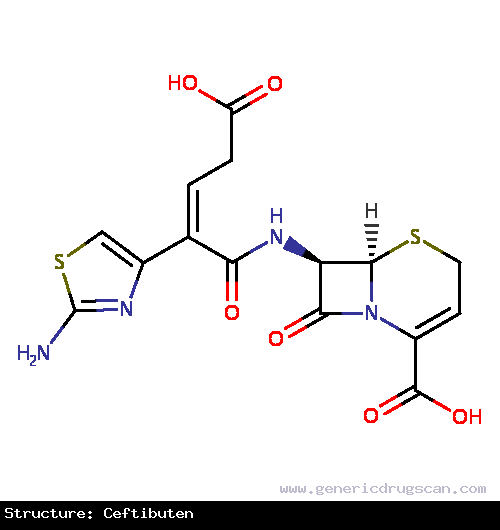Ceftibuten Drug: Indication, Dosage, Precaution, Side Effect , Storage, Category Type and corresponding Brands - www.genericdrugscan.com
Ceftibuten
Drug Status in USA : Approvedpronunciation
pronounced as (sef tye' byoo ten)
Why is this medication prescribed?
Ceftibuten is used to treat certain infections caused by bacteria such as bronchitis (infection of the airway tubes leading to the lungs); and infections of the ears, throat, and tonsils. Ceftibuten is in a class of medications called cephalosporin antibiotics. It works by killing bacteria.
Antibiotics such as ceftibuten will not work for colds, flu, or other viral infections. Using antibiotics when they are not needed increases your risk of getting an infection later that resists antibiotic treatment.
How should this medicine be used?
Ceftibuten comes as a capsule and suspension (liquid) to take by mouth. It is usually taken once a day for 10 days. Take the suspension on an empty stomach, at least 2 hours before or 1 hour after eating; the capsules can be taken with or without food. Take ceftibuten at around the same time every day. Follow the directions on your prescription label carefully, and ask your doctor or pharmacist to explain any part you do not understand. Take ceftibuten exactly as directed. Do not take more or less of it or take it more often than prescribed by your doctor.
Shake the suspension well before each use to mix the medication evenly.
You should begin to feel better during the first few days of treatment with ceftibuten. If your symptoms do not improve or get worse, call your doctor.
Continue to take ceftibuten even if you feel better. If you stop taking ceftibuten too soon or skip doses, your infection may not be completely treated and the bacteria may become resistant to antibiotics.
What are the precautions to be followed?
Before taking ceftibuten,- tell your doctor and pharmacist if you are allergic to ceftibuten; other cephalosporin antibiotic such as cefaclor (Ceclor), cefadroxil cefazolin (Ancef, Kefzol), cefdinir, cefditoren (Spectracef), cefepime (Maxipime), cefixime (Suprax), cefotaxime (Claforan), cefotetan, cefoxitin (Mefoxin), cefpodoxime, cefprozil, ceftaroline (Teflaro), ceftazidime (Fortaz, Tazicef, in Avycaz), ceftriaxone (Rocephin), cefuroxime (Zinacef),and cephalexin (Keflex); penicillin antibiotics; or any other medications. Also tell your doctor if you are allergic to any of the ingredients in ceftibuten capsules or suspension.
- tell your doctor and pharmacist what prescription and nonprescription medications, vitamins, nutritional supplements, and herbal products you are taking, or plan to take. Your doctor may need to change the doses of your medications or monitor you carefully for side effects.
- tell your doctor if you have or have ever had gastrointestinal disease (GI; affecting the stomach or intestines), especially colitis (condition that causes swelling in the lining of the colon
- large intestine
- tell your doctor if you are pregnant, plan to become pregnant, or are breastfeeding. If you become pregnant while taking ceftibuten, call your doctor.
- If you have diabetes, you should know that ceftibuten suspension solution contains sucrose (sugar).
What are possible side effects of this medication ?
Ceftibuten may cause side effects. Tell your doctor if any of these symptoms are severe or do not go away:- diarrhea
- stomach pain
- nausea
- vomiting
- heartburn
- headache
- dizziness
- watery or bloody stools, stomach cramps, or fever during treatment or for up to two or more months after stopping treatment
- rash
- itching
- hives
- difficulty breathing or swallowing
- wheezing
- a return of fever, sore throat, chills, or other signs of infection
How to store the medication and dispose it of after its use later?
Keep this medication in the container it came in, tightly closed, and out of reach of children. Store the capsules at room temperature and away from excess heat and moisture (not in the bathroom). Keep liquid medicine in the refrigerator, closed tightly, and dispose of any unused medication after 14 days.
Unneeded medications should be disposed of in special ways to ensure that pets, children, and other people cannot consume them. However, you should not flush this medication down the toilet. Instead, the best way to dispose of your medication is through a medicine take-back program.
Drug Category/Class
- Cephalosporins
- Third-Generation Cephalosporins
- Antibacterials for Systemic Use
- Antiinfectives for Systemic Use
- Third-generation cephalosporins
| Prescribed | Used to treat acute bacterial exacerbations of chronic bronchitis (ABECB), acute bacterial otitis media, pharyngitis, and tonsilitis. |
| Weight : | 410.425 |
| Structure | Ceftibuten |
 | |
| Formula | C15H14N4O6S2 |
Ceftibuten has 2 Brands listed
| Procadax (400 mg) | Procadax DS (30 ml) |
Search Generic Drugs alphabetically
